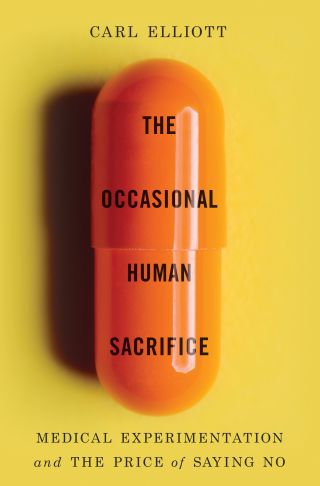Psychopharmacology
Whistleblowers and Medical Fraud: A Book Review
A new book on the history—and price—of exposing corruption in medical research.
Updated May 15, 2024 Reviewed by Michelle Quirk
Key points
- In medicine, whistleblowers face institutional denial, stonewalling, retaliation, and other kinds of reprisal.
- They expose coercive recruitment practices, conflicts of interest, weak protocols, and missing consent.
- In revisiting some of medicine’s worst scandals, a new book details the efforts taken to block accountability.

“Nobody should indulge in the fantasy that they will be celebrated for blowing the whistle,” warns Carl Elliott in his riveting new book, The Occasional Human Sacrifice: Medical Experimentation and the Price of Saying No, published today by Norton. “It is more likely that they will be vilified, forgotten, or both.”
The more than half-dozen cases detailed in his investigation bear out that message with telling regularity. Whether from institutional denial, stonewalling, protection, retaliation, or other kinds of reprisal, whistleblowing in medicine is shown to carry a high risk of failure. Those seeking accountability are often the only ones to face any consequences, and they can be severe: demotion or job loss, hefty legal fees, unwanted notoriety, and a strong risk of being disowned by one’s coworkers.
“It's a demoralizing book,” Elliott tells me when I request an advance copy, “but, well, that’s what the subject demanded.” It does. The scale of injury detailed in each chapter—coupled with extensive evidence from archives and local media—is as daunting as are the many efforts by institutions to deny error and responsibility.
Even more tawdry are examples where the culpable feign unjust persecution, claiming that they are the real victim—of a witch-hunt or smear campaign. On several occasions, the fervor of denial is enough to persuade oddly incurious review boards and regulatory agencies that the malpractice is sound, even that the work merits praise and prizes (in one case, a Nobel).
Meanwhile, those driven to expose the fraud—whether of coercive recruitment practices, glaring conflicts of interest, failure to establish informed consent, or vague protocols and missing control groups—can end up fired, discredited, and rejected. “What we do essentially,” a manager concedes, “is put [the colleague] in a little boat, tow it out to sea, and cut the rope. We never think about [them] again.”
“I felt an antipathy against me,” one employee recalls after a well-considered decision to take his findings to the agency empowered to investigate them. “They feared I was opening my mouth too wide.”
Another is berated for confirming that two patients had recently died on the study protocol, a harbinger of dozens more: “Who the hell are you to question what we do around here?” A third remembers, “Everyone at work looked at me like I was a cobra. I couldn’t have been more alone if they put me in the toilet.”
While revisiting some of medicine’s worst scandals—examples include four decades of intentionally untreated syphilis in hundreds of African-American men, a hepatitis experiment on dozens of intellectually disabled children, a years-long series of deadly total body irradiation experiments involving the federal government, even a cover-up of egregious fraud at the same institute in Sweden that awards the Nobel Prize in medicine—Elliott provides nuanced portraits of each whistleblower, including their motivation and psychology.
Invaluably, Elliott ends up amplifying a larger theme of institutional cowardice in the face of well-evidenced corruption. One whistleblower marvels of his former coworkers, “It was astounding that nobody gave a damn,” even about a study associated with high rates of death. Others are baffled that so many peers and reviewers uncover the fraud but do nothing about it, asking: “How do you stand by and let these things happen?”
Atypical Antipsychotics and Forced Consent
Prefacing each example of medical malpractice is Elliott’s gripping account of his own seven-year ordeal after reporting on a research scandal at his home university, where for 11 years he had taught ethics in its medical school. In May 2003, the university’s Department of Psychiatry oversaw the study of second-generation antipsychotics that included a shockingly violent suicide. As reported by “Side Effects” in 2009 after further details were reported by a local newspaper, the patient had been enrolled in the study over the stated objections of his mother, since he was then in the midst of a full-blown episode and might pose a risk to himself or others. Elliott elaborates:
The study in which Markingson died was funded by the pharmaceutical company AstraZeneca and designed to test its antipsychotic drug Seroquel. The study was marked by alarming red flags: conflicts of interest, financial pressures to get subjects into the study, a locked psychiatric unit where severely ill patients were targeted for recruitment. Most disturbing of all were the conditions under which Markingson was enrolled.… Not only was [he] psychotic when he signed the consent form, he was under a civil commitment order that legally required him to obey the recommendations of his psychiatrist. His mother wanted him to have nothing to do with the study. [The study leader] enrolled Markingson anyway.
Further investigation unearths a disturbing number of malpractice cases in the same department: a nonconsensual addiction experiment on illiterate Hmong opium addicts, the injuries or deaths of 46 mentally ill patients under the care of a different faculty member. The professor leading the study in which Markingson died previously led a study on an experimental antipsychotic that, too, became associated with intense suicide ideation, previously unremarked. In that case, the patient managed to drop out of the trial, avoiding further risk of self-harm.
The reporting and investigation that Elliott felt compelled to pursue end up involving years of university stonewalling. Relations with even supportive colleagues sour. The intervention leads, eventually, to Senate hearings, an external review that faults the university’s oversight program and the passage of a new law in Minnesota meant to raise standards in medical research. But it generates no formal apology to Markingson’s mother. What she receives instead is a bill for legal fees sent by the same university that failed to sanction the forced participation of her son in a problematic clinical trial, even as it resulted in his death.
When Whistleblowing Backfires

This is the type of maddening pattern that repeats throughout The Occasional Human Sacrifice. Publicly stated concerns about misconduct are shown to backfire, sometimes spectacularly, leading to the demotion and discrediting of previously valued colleagues. In the process, review boards and sponsoring departments end up sullied and compromised—silent accomplices to malpractice—even as they may spend years fighting the charges and proclaiming the exposure to be the only cardinal sin.
The brilliance of Elliott’s book lies in the lessons it draws from overlooked detail. In the infamous Tuskegee, Alabama, experiment by the U.S. Public Health Service on hundreds of poor Black men with syphilis, where the agency “used free meals and burial insurance to lure them into an experiment in which they would receive no treatment for [the] potentially deadly disease,” the detail is that “very few employees of the health service … saw anything wrong with this.”
The experiment ran for 40 years and took another seven to bring fully to light: “The public health establishment fought [discovery] at every turn. When the study was finally exposed, the federal government resisted paying for medical treatment for the victims. Another twenty-five years passed before the government apologized.”
“I think there is a ‘there’ there that we just maybe didn’t want to see,” an investigator tells Elliott of the staggering institutional blindspots that recur throughout, especially when reputations and significant funds are at stake. Concerning efforts to shield yet another study from investigation, Elliott adds: “It wasn’t just that they were unhappy to see their dirty laundry aired in public. Many of them didn’t think the laundry was dirty.”
“The force of social conformity is especially powerful in institutions that are driven by a sense of moral purpose,” notes Yale social psychologist Irving Janis, who is quoted in the book. “In academic health centers, that moral purpose is embedded in the dogma that medical research saves lives.”
“Since our groups’ objectives are good,” Janis continues, characterizing what the participants are said to feel, “any means we decide to use must be good.”
References
Elliott, C. (2024). The Occasional Human Sacrifice: Medical Experimentation and the Price of Saying No. New York: Norton.




